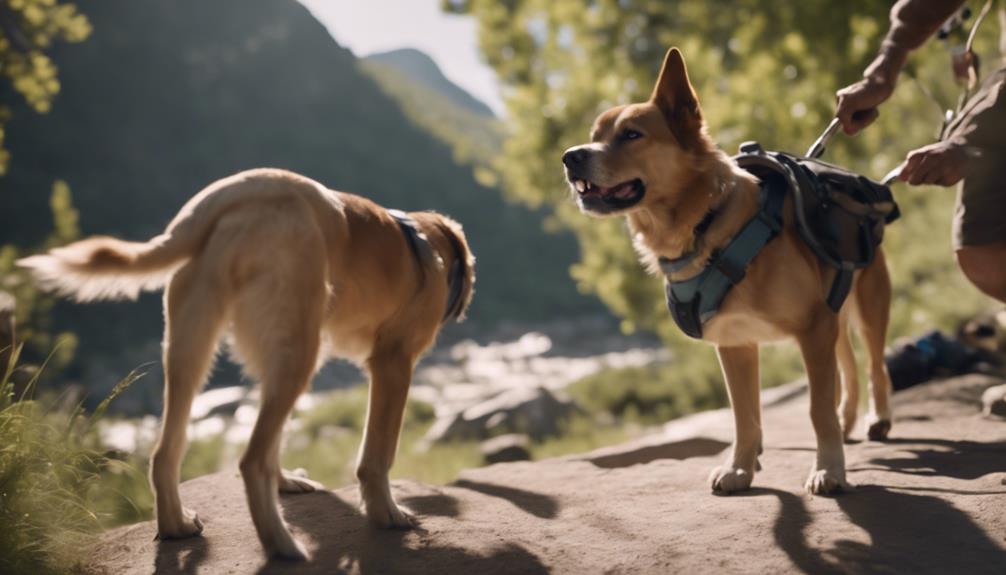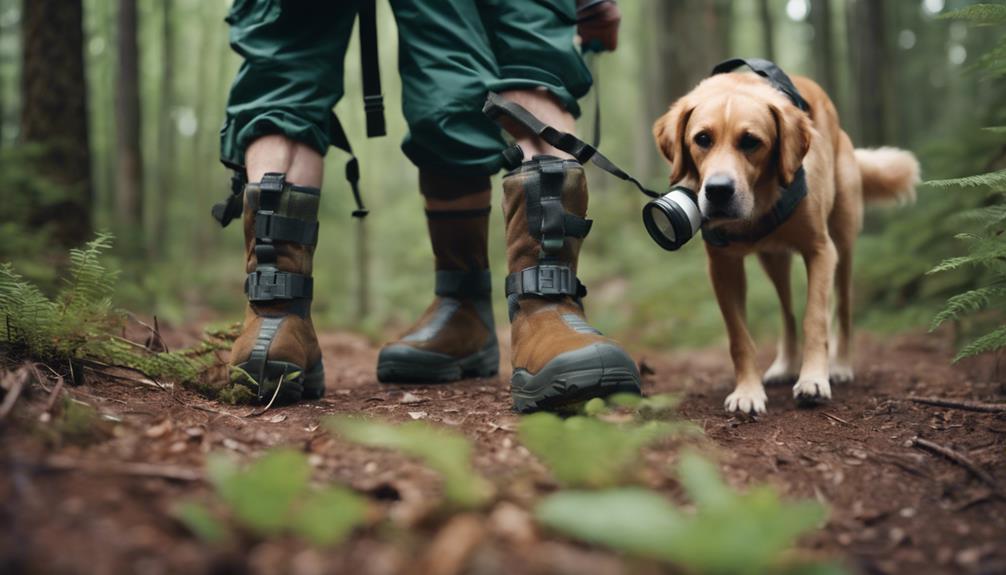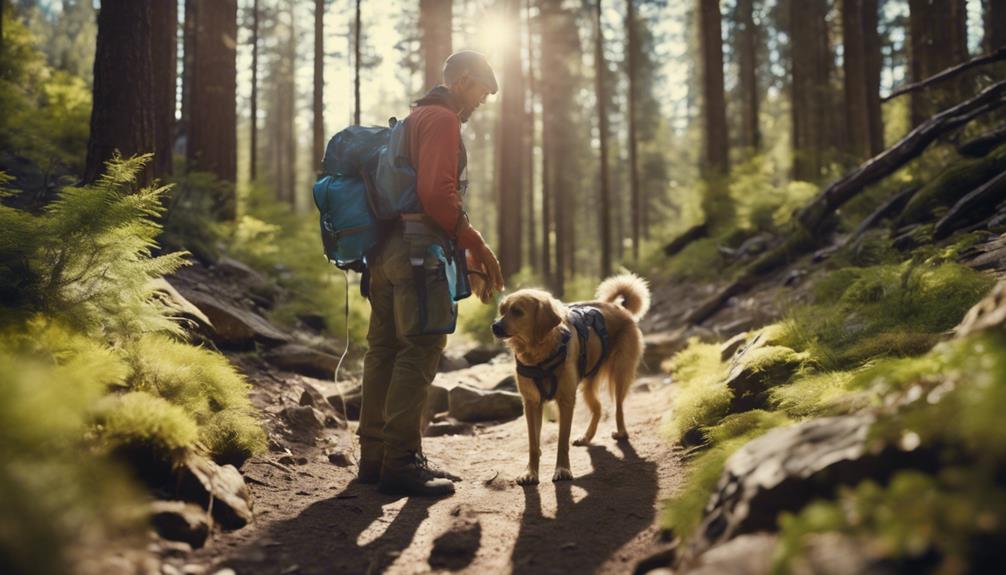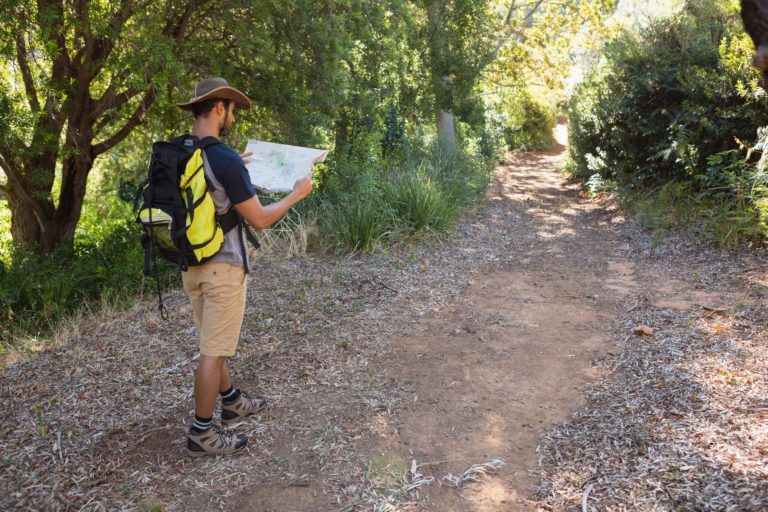Veterinarian Reveals Life-Saving Dog Hiking Tips
When hiking with your dog, it's important to be prepared for potential trail hazards. Make sure to pack a first-aid kit that includes Benadryl for insect stings and allergic reactions.
If your dog is bitten by a snake, keep them calm and seek veterinary help immediately. To avoid heat-related issues, opt for hiking during cooler times of the day and take frequent water breaks for your furry companion.
Apply tick preventives before hitting the trails and check your dog thoroughly after each hike. Keep an eye out for symptoms of marijuana intoxication, such as unsteadiness.
Always keep your dog on a leash and bring enough water for both of you to stay hydrated. These tips are just the beginning to guarantee a safe and enjoyable outdoor adventure with your beloved pet.
Common Injuries on the Trail

When you head out on a hike with your dog, it's crucial to be ready for common injuries that may occur along the way. Insect stings are a common issue that can lead to allergic reactions in some dogs, showing symptoms like swelling, redness, and itching. If you spot these signs, remove the stinger and give your pup some Benadryl.
Sometimes, your dog may get a sprain or strain from getting too excited on rough terrain. If you notice limping, it's time to take a break and apply some ice to the affected area. Keep an eye out for foot pad injuries as well, checking your dog's paws regularly for cuts or any foreign objects that may have gotten stuck.
Don't forget to pack a first aid kit with essentials like bandages, antiseptic wipes, and tweezers. Being prepared can greatly help in ensuring your hiking partner's safety and comfort during your outdoor adventures.
Snake Bite Prevention and Treatment
When hiking with your dog, it's important to be aware of the potential threat of snake bites. Research the types of venomous snakes in your area before heading out on the trails. Keep a lookout for these snakes, especially in rocky or sunny areas where they may be more active. If your dog does get bitten, typically on the muzzle or legs, quick action is crucial.
If your furry companion encounters a snake, remember these steps:
- Stay calm and collected to make rational decisions.
- Keep your dog as still as possible to prevent the venom from spreading quickly.
- Contact your veterinarian immediately for expert advice and guidance.
- Administer Benadryl if your vet recommends it to help reduce swelling and other symptoms.
Avoiding Heat-Related Illnesses

As temperatures rise, it's crucial to remember that dogs are more vulnerable to heat-related illnesses than humans while hiking. Dogs can't sweat like us to cool off, making them more at risk due to their higher core body temperature.
To ensure your furry companion's safety, plan your hikes for cooler times of the day, such as early mornings or evenings. During your trek, provide regular shade breaks and water stops. Consider using cooling vests to help regulate your dog's body temperature.
Keep an eye out for signs of heat exhaustion, such as excessive panting, drooling, or lethargy. If you notice these symptoms, seek shade immediately and cool your dog with water. Avoid submerging them in cold water or using ice, as it can shock their system.
Tick Awareness and Removal
Before heading out on a hike with your dog, it's crucial to protect them from ticks and know how to deal with these pesky parasites. Applying a tick preventive before your outdoor adventure and conducting a thorough tick check afterwards are key steps to safeguard your furry companion.
Female ticks can cause paralysis in dogs, so prompt removal is essential for their well-being. If you discover a tick on your dog, follow these steps:
- Stay calm to reassure your dog and maintain a steady demeanor.
- Use fine-tipped tweezers to grasp the tick as close to the skin as possible.
- Pull the tick upward with even pressure, avoiding any twisting movements.
After removing the tick, clean the area with antiseptic to prevent infection. Monitor your dog for any signs of lameness or swelling in the weeks following the incident. If you have any concerns about tick removal or notice worrisome symptoms, reach out to your veterinarian for expert guidance and assistance.
Marijuana Intoxication Risks

When hiking with your dog, it's essential to be mindful of the potential risks of marijuana intoxication, even if you don't partake in its use. Your furry companion may accidentally ingest marijuana residue left behind by other hikers. Look out for signs such as wobbliness and excessive drooling, as these could be indications of THC intoxication.
If you suspect that your dog has consumed marijuana, try to stay calm. While there isn't a specific treatment, you can assist by ensuring they're comfortable and well-hydrated. The effects will gradually diminish, but it's advisable to reach out to a vet if you have concerns.
Conclusion
Equipped with these essential tips, you're all set to hit the trails with your furry companion. Think of this knowledge as your reliable guide, helping you navigate any challenging terrain while avoiding potential risks.
Remember, being proactive is crucial, but being ready for any unforeseen situations is just as important. Stay vigilant and prepared, ensuring that your outdoor escapades aren't only safe but truly enjoyable.
So, gear up, pack your dog's first-aid essentials, and embark on your next adventure with confidence!







